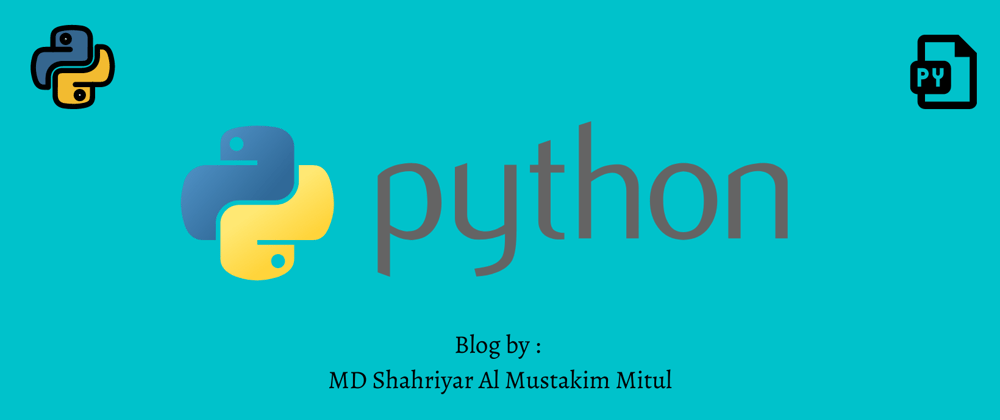Python print
print("Hello there from Mitul!")#printing a string
print(1,2,3,4)#printing 4 values
var=100
print('The value is',var)#printing the variable
print(1,2,3,4,sep='+')#separate the values based on the sep
print(1,2,3,4,sep='*',end='&')#separate the value based on sep and add end at the last
print('I like to eat {0} and {1}'.format('bread','butter')) # use the value from format as index meaning {0} for the 1st value and {1} for the 2nd value
print('I like to eat {1} and {0}'.format('bread','butter'))
Python File
import os
print(os.getcwd()) #shows current directory
#changing working directory to Filetest
os.chdir('E:\My-University-Life-Learning\Semester 1\Filetest')
#checking what are there in the directory
print(os.listdir())
#checking the current directory
print(os.getcwd())
#to make a directory
os.mkdir('New Directory')
#used to rename a directory
os.rename('New Directory','Updated Directory')
#remove a file
os.remove('<file_name>')
#remove a directory
os.rmdir('Updated directory')
Python Numbers
"""
0b or 0B : Binary number prefix
0o or 0O : Octal Number prefix
0x or 0X : Hexadecimal number prefix
"""
#checking if 100 is int or float or complex
value=100
print(type(value))
print(isinstance(value,int))
print(isinstance(value,float))
print(isinstance(value,complex))
#checking if 100.24 is int or float or complex
value1=100.24
print(type(value1))
print(isinstance(value1,int))
print(isinstance(value1,float))
print(isinstance(value1,complex))
#checking if 100+5j is int or float or complex
value2=100+5j
print(type(value2))
print(isinstance(value2,int))
print(isinstance(value2,float))
print(isinstance(value2,complex))
print(0b1101)# Ob means binary
print(0xab) #0x means hexadecimal
print(0o23) #0o means octal
#using Decimal module to calculate float point summation , multiplication etc
#1
data=0.1+0.2
print(data)
#solving this issue:
from decimal import Decimal as D
print(D('0.1')+D('0.2'))
#2
data_1=1.20*2.50
print(data_1)
print(D('1.2')*D('2.50'))
#using fraction
from fractions import Fraction as F
print(F(1.5))
print(F(5))
print(F(1,5))
#using math module
import math
print(math.pi)
print(math.cos(10))
print(math.log(10))
print(math.log10(10))
print(math.exp(10))
print(math.factorial(5))
print(math.sinh(10))
#python random module
import random
print('Random number ->',random.randrange(5,15)) #printing any random number between 5 to 15
#choosing something from the list
day_list=['Sat','Sun','Mon','Wed','Thu','Fri']
print(random.choice(day_list))
#shuffling a list
print(day_list)
print(random.shuffle(day_list))
print(day_list)
#any element randomly
print(random.random())
Python namespace
#same value like a=2 and b=2 has the same address
a=2
print('id(2)=',id(2))
print('id(a)=',id(a))
a=3
print('id(3)=',id(3))
print('id(a)=',id(a))
b=2
print('id(2)=',id(2))
print('id(b)=',id(b))
Output:
id(2)= 2342642018640
id(a)= 2342642018640
id(3)= 2342642018672
id(a)= 2342642018672
id(2)= 2342642018640
id(b)= 2342642018640
Python Scoping
def outer_function():
global a
a=20
def inner_function():
global a
a=30
print('Third a=',a)
inner_function()
print('Fourth a=',a)
a=10
print('First a=',a)
outer_function()
print('Second a=',a)
Python nonlocal variable
Nonlocal:
def outer():
x="local"
def inner():
nonlocal x #making the x variable of outer() global
x="hola"
print("inner",x)
inner()
print("outer:",x)
outer()
Python Iterator
iter() method
list_1=[44,77,11,33]
iter_1=iter(list_1) #creating iterator object by calling iterclass
print(iter_1)
next() method:
list_1=[44,77,11,33]
iter_1=iter(list_1)
print(next(iter_1)) #now using next class while using iter_1 object to get 1st value
print(next(iter_1)) # to get 2nd value as used 2nd time
print(iter_1.__next__()) #get 3rd value
Making an iterator using class:
#making an iterator
class Pow_of_two:
def __init__(self,max=0):
self.max=max
def __iter__(self):
self.n=0
#print("self.n value:",self.n)
return self
def __next__(self):
if self.n<=self.max:
#print("self.n",self.n)
#print("self.max",self.max)
result=2**self.n # 2^(self.n)
self.n+=1
return result
else:
raise StopIteration
#print(Pow_of_two.__doc__)
a=Pow_of_two(4) #a is an object of Pow_of_two
i=iter(a) #using the object a in iter method
print(next(i))
print(next(i))
print(next(i))
"""process :
a object
i object of next method
print(next(i)) which is print(next(4))
self.n=0
self.max=4
result =2^0
return 2^0
again,
self.n=1
self.max=4
result =2^1
return 2^1
self.n=2
self.max=4
result =2^2
return 2^2"""
Using for loop to iterate:
#1
list_1=[3,2,5,6,8]
for i in list_1:
print(i)
#2
for i in range(7,11):
print(i)
Python Inheritance
class myBird:
def __init__(self):
print("myBird class constructor is executing...")
def whatType(self):
print("I am a bird...")
def canSwim(self):
print("I can swim.....")
class myPenguin(myBird):
def __init__(self):
super().__init__() #what is it's work!
print("myPenguin class constructor is executing...")
def whoisThis(self):
print("I am Penguin....")
def canRun(self):
print("I can run faster......")
pg1=myPenguin()
pg1.whatType()
pg1.whoisThis()
pg1.canSwim()
pg1.canRun()
Multiple Inheritance
#Multiple Inheritance
class Base1:
pass
class Base2:
pass
class MultiDerived(Base1,Base2):
pass
class Base1:
def funcBase1(self):
print("funcBase1 is executing...")
class Base2:
def funcBase2(self):
print("funcBase2 is executing....")
class Base3:
def funcBase3(self):
print("funcBase3 is executing...")
class MultiDerived(Base1,Base2,Base3):
def funcMultiDerived(self):
print("funcMultiDerived() is executing ....")
md1=MultiDerived()
md1.funcBase1()
md1.funcBase2()
md1.funcBase3()
md1.funcMultiDerived()
Python Exception
AssertionError , AttributeError, EOFError, FloatingPointError, GeneratorExit , ImportError, IndexError
try:
'''Block for trying the code'''
a="hi"
b=int(a)
except:
print("Exception Caught")
Along with finally
example 1:
try:
'''Block for trying the code'''
a="hi"
b=int(a)
except:
print("Exception Caught")
finally:
print("Finally block")
example 2:
try:
a=int(input("Please enter the first number: "))
b=int(input("Please enter the second number: "))
if (a<0): # for negative numbers
raise TypeError
c=a/b
print("{} / {} = {}".format(a,b,c))
except ZeroDivisionError:
print("Division by zero is not positive")
except ValueError: # if not given digits or number
print("The data types are not proper")
except TypeError: # for negative numbers case
print("The data is not in range")
except NameError: # if used new variable
print("The data items are not defined")
User defined exception
#creating an exception class
class VoterEligibility(Exception):
def __init__(self):
super() # The super() function in Python makes class inheritance more manageable and extensible.
try:
age="12"
if age<18:
raise VoterEligibility
except TypeError:
print("Age is not numeric")
except VoterEligibility:
print("Age is less than 18")
else:
print("Age is greater than or equal 18")
finally:
print("End of the program")
Nested Dictionary
people={1:{'name':'Karim','age':'27','sex':'Male'},2:{'name':'Rahima','age':'21','sex':'Female'}}
for p_id,p_info in people.items():
print("\nPerson ID:",p_id)
for i in p_info:
print(i+':',p_info[i])
Output:
Person ID: 1
name: Karim
age: 27
sex: Male
Person ID: 2
name: Rahima
age: 21
sex: Female
Python Operator overloading
class myPoint:
def __init__(self,x=0,y=0): #constructor
self.x=x
self.y=y
def __str__(self): #if there is any string value passed, we then use this
return "{0},{1}".format(self.x,self.y)
def __add__(self, other):
x=self.x+other.x
y=self.y+other.y
return myPoint(x,y)
def __lt__(self, other):
self_mag=(self.x**2)+(self.y**2)
other_mag=(other.x**2)+(other.y**2)
return self_mag < other_mag #if self_mag < other_mag then will return True
p1=myPoint(1,2)
p2=myPoint(4,5)
print(p1)
print(p2)
print(p1<p2)
print(p1+p2)
print(p1.__lt__(p2))
print(p2.__lt__(p1))
Python Generator
Example 1:
#creating a generator function
def my_generator():
n=1
print("This is printed first")
yield n #yielt pauses the function all its state and later continues from there
#important to use next()
n+=1
print("This is printed second")
yield n
n+=1
print("This is printed at last")
yield n
a=my_generator()
#Iterrating using text
next(a)
next(a)
next(a)
print("Using for loop..")
#Iterating using for loop
for item in my_generator():
print(item)
Example 2:
#reverse a string
def reverse_string(my_string):
length=len(my_string)
for i in range(length-1,-1,-1):
yield my_string[i]
for char in reverse_string("WORLD"):
print(char)
Python Decorator
Example 1:
#Demonstration
def make_decorated(func):
def inner_function():
print("I got decorated")
func()
return inner_function()
def simple_func():
print("I am a simple function")
decor=make_decorated(simple_func)
decor() #calling decor
or,
#Demonstration
def make_decorated(func):
def inner_function():
print("I got decorated")
func()
return inner_function()
@make_decorated #make decorated will be used
def simple_func():
print("I am a simple function")
simple_func() #calling the simple_func()
Example 2:
def my_smart_div(func):
def inner_func(x,y):
print("I am dividing ",x," and ",y)
if y==0:
print("Oops! Division by Zero is illegal")
return
return func(x,y)
return inner_func # YOU CANNOT use inner_func()
#Generally , we decorate a function and reassign it as , go_divide=my_smart_div(go_divide)
@my_smart_div #when the decoration function is called, it will take go_divide() as func and work
def go_divide(a,b):
return a/b
print(go_divide(20,2))
print(go_divide(20,0))
Python Matrix
#a is a 2D matrix
a=[['Roy',80,90,100,110,120],
['John',10,20,30,40,50],
['Dave',20,30,40,60,70]]
#b is a nested list
b=[['Mitul',80,90,100,110,120],
['Johny',10,20,30,40],
['David',20,30,40,60,70]]
print(a)
print(b)
Python Regular Expression
Searching using search
Example 1:
import re
if re.search("ape","The ape was at the apex"):
print("There is an ape")
Example 2:
finditer()
import re
str_0="The ape was at the apex"
for i in re.finditer("ape.",str_0):
tup_0=i.span() #span returns a tuple
print(tup_0)
print(str_0[tup_0[0]:tup_0[1]])#as tup_0 has 2 values (4,8) so, we get from str_0[4] to str_0[8] . Thus ape and later for (19,23) we get apex
"""As we get ape first so , we get 4 index and new word starts from 8th index
the span() returns (4,8) and again we get apex and this we got again (19,23)"""
re.findall()
import re
str_0="Cat rat mat fat pat"
update_animal=re.findall("[crmfp]at",str_0)#c/r/m/f/p at
for i in update_animal:
print(i)
or,
import re
str_0="Cat rat mat fat pat"
update_animal=re.findall("[c-mC-M]at",str_0)#from c to m and from C to M
for i in update_animal:
print(i)
or,
import re
str_0="Cat rat mat fat pat"
update_animal=re.findall("[^Cr]at",str_0)#other than C and r
for i in update_animal:
print(i)
or,
import re
str_0="rat cat mat pat"
regex=re.compile("[cr]at")
print(regex)
str_0=regex.sub("owl",str_0)#starting with [cr] will be replaced with owl
print(str_0)
Raw string
import re
string_0="Here is \\stuff"
#we won't get \\stuff here
#print("Find \\stuff : ",re.search("\\stuff",string_0))
#we can now get \\stuff index
#print("Find \\stuff : ",re.search("\\\\stuff",string_0))
#using raw string as r
print("Find \\stuff : ",re.search(r"\\stuff",string_0))
or,
import re
str_0="F.B.I. I.R.S. CIA"
print("Matches :",len(re.findall(".\..\..",str_0)))
print("Matches :",re.findall(".\..\..",str_0))
Convering newlines to one line
import re
str_0="""This is a long
string that goes
on for many lines"""
print(str_0)
#removing newlines
regex=re.compile("\n")
str_0=regex.sub(" ",str_0)
print(str_0)
#other than this we can use \b,\f,\r,\t,\v
Checking number
import re
str_0="12345"
#will check if there is any single number
print("Matches : ",len(re.findall("\d",str_0)))
print("Matches : ",re.findall("\d",str_0))
or,
import re
#matche value between 5 numbers only
if re.search("\d{5}","12345"):
print("It is a zip code")
str_0="123 12345 123456 1234567"
#matches value that are between 5 and 7 digits
print("Matches :",len(re.findall("\d{5,7}",str_0)))
or,
import re
#\w is the same as [1-zA-Z0-9]
#\W is the same as [^a-zA-Z0-9]
str_0="412-555-1212"
if re.search("\w{3}-\w{3}-\w{4}",str_0):
print("It is a phone number")
if re.search("\w{2,20}","Ultraman"):
print("It is a valid name")
or,
import re
#\s or \s means [\f\n\r\t\v]
if re.search("\w{2,20}\s\w{2,20}","Toshio Muramatsu"):
print("It is a valid full name")
or,
import re
#+ matches 1 or more character
print("Matches : ",len(re.findall("a+","a as ape bug")))
print("Matches : ",re.findall("a+","a as ape bug")) # these 3 words have a once at a time
Email scrapping
import re
#1to 20 lowercase and uppercase letters, numbers,plus ._%+ (means we can have any letters and _ and % and +)
#An @ symbol
#2 to 20 lowercase and uppercase letters, numbers, plus .- (means that we can have any letter and a - too)
#A period
#2 to 3 lowercase and uppercase letters
emaillist="db@aol.com m@.com @apple.com db@.com +a@max.com %jola@hmail.com karim_saheb@gmail.com karim-raza@gmail.com hola@gmai-l.com"
print("Email Matches : ",len(re.findall("[\w._%+-]{1,20}@[\w.-]{2,20}.[A-Za-z]{2,20}",emaillist)))
print("Email Matches : ",re.findall("[\w._%+-]{1,20}@[\w.-]{2,20}.[A-Za-z]{2,20}",emaillist))
Python list comprehension
Using a for loop
list_0=[]
for i in 'python':
list_0.append(i)
print(list_0)
List comprehension
list_0=[i for i in "human"]
print(list_0)
Lambda function
list_0=list(map(lambda i:i,"human")) # creating a map object and then making it a list
#lambda as i variable and is picking eaching value from the string "human"
print(list_0)
Nested if with list comprehension
list_0=[y for y in range(100) if y%2==0 if y%5==0] # y will be in the list in range from 0 to 99 and that has to be divisible by 2 and 5
print(list_0)
or
obj=["Even" if i%2==0 else "Odd" for i in range(10)] # for i in range 0 to 99, if i%2==0 then even or else
Transpose matrix
matrix=[[1,2],[3,4],[5,6],[7,8]]
"""
Matrix:
[1 2]
[3 4]
[5 6]
[7 8]"""
"""Transpose
[1 3 5 7 ]
[2 4 6 8 ]
"""
transpose=[[row[i] for row in matrix]for i in range(2)]
"""i has range(0,1)
fow gets a value first [1,2]
then [1,2][0]=1
[[1][]]
then [1,2][1]=2
thus
[[1][2]]
and like this we have [[1,3,5,7],[2,4,6,8]]
which is
[1 3 5 7 ]
[2 4 6 8 ]"""
print(transpose)
Recursion
def fact(n):
if n<=1:
return 1
return n*fact(n-1)
print("Factorial of 5 is",fact(5))
Deep copy and shallow copy
Normal copy
list_0=[[1,2,3],[4,5,6],[7,8,9]]
list_1=list_0
print(list_0)
print(list_1)
list_1.append([10,11,12])
#both id's are same
print(id(list_0))
print(id(list_1))
print(list_0)
print(list_1)
Output:
Both id's are same
[[1, 2, 3], [4, 5, 6], [7, 8, 9]]
[[1, 2, 3], [4, 5, 6], [7, 8, 9]]
2440548853184
2440548853184
[[1, 2, 3], [4, 5, 6], [7, 8, 9], [10, 11, 12]]
[[1, 2, 3], [4, 5, 6], [7, 8, 9], [10, 11, 12]]
Shallow Copy
id's are different and if one is changed , other is not updated
import copy
old_list=[[1,2,3],[4,5,6],[7,8,9]]
new_list=copy.copy(old_list)
#both id's are different now
print(id(old_list))
print(id(new_list))
print(old_list)
print(new_list)
#now if we update old list, no change is made to the new list
old_list.append(['new update'])
print(old_list)
print(new_list)
Output:
1710618912384
1710618781312
[[1, 2, 3], [4, 5, 6], [7, 8, 9]]
[[1, 2, 3], [4, 5, 6], [7, 8, 9]]
[[1, 2, 3], [4, 5, 6], [7, 8, 9], ['new update']]
[[1, 2, 3], [4, 5, 6], [7, 8, 9]]
Deep copy
id's remain different but if one is changed then other is changed too
import copy
old_0_list=[[1,1,1],[2,2,2],[3,3,3]]
new_1_list=copy.deepcopy(old_0_list)
#id's are different
print(id(old_0_list))
print(id(new_1_list))
#here if one is updated, other is updated too
print(old_0_list)
print(new_1_list)
old_0_list[1][0]=0
print(old_0_list)
print(new_1_list)
Output:
1571582711616
1571582580544
[[1, 1, 1], [2, 2, 2], [3, 3, 3]]
[[1, 1, 1], [2, 2, 2], [3, 3, 3]]
[[1, 1, 1], [0, 2, 2], [3, 3, 3]]
[[1, 1, 1], [2, 2, 2], [3, 3, 3]]
Lambda
anonymous function is taken as lambda
a=lambda x: x*2 #means anonymous function has variable called x and x=x*2
#we can call this anonymous function with the name a as it is assigned there
print(a(10))
or,
list_0=[1,2,3,4,5]
#filter will take all values of list_0 and will return x for which (x%2==0)
new_list=list(filter(lambda x:(x%2==0),list_0))
print(new_list)
or,
list_0=[1,2,3,4,5]
#filter will take all values of list_0 and will return x for which (x%2==0)
new_list=list(map(lambda x:x*2,list_0))
print(new_list)
#Output
#[2, 4, 6, 8, 10]
Python Assert
def avg(marks):
assert len(marks)!=0 #when we want to state that what should be done ex: here we dont want that len(marks) remain 0
#if the statement in assert is true, then there is no error but if the statement is false, it stops and shows an error
return sum(marks)/len(marks)
marks=[] #the method won't work for this function
print(avg(marks))
#Output:
#AssertionError
or,
def avg(marks):
assert len(marks)!=0,"List is empty" #when we want to state that what should be done ex: here we dont want that len(marks) remain 0
#if the statement in assert is true, then there is no error but if the statement is false, it stops and shows an error
return sum(marks)/len(marks)
marks=[] #the method won't work for this function
print(avg(marks))
#Output:
#AssertionError: List is empty
Python Property
property() is a built in function mcreates and returns a property object
property(fget=None,fset=None,fdel=None,doc=None)
property object has getter method , setter method and delete method
class Temp_Celcius:
def __init__(self,temperature=0):
print("Assigning temperature value")
self.__temperature=temperature
def convert_to_fahrenhite(self):
return (self.__temperature*1.8)+32
def get_temperature(self):
print("Getting temperature value")
return self.__temperature
def set_temperature(self,value):
if value<-273:
raise ValueError("Temperature below -273 is not possible ")
print("Setting temperature value")
self.__temperature=value
temperature=property() #temperature=property(get_temperature,set_temperature)
#assigning getter method fget
temperature=temperature.getter(get_temperature) #method name assigned
#assigning fset
temperature=temperature.setter(set_temperature)
c=Temp_Celcius(5)#setting the value of c
print(c.temperature)#getting the value of c
c.temperature=100
print(c.temperature)
#Output:
#Assigning temperature value
#Getting temperature value
#5
#Setting temperature value
#Getting temperature value
#100
Python Closure
def print_message(message):#a closure function
def print_message_inner():
print(message) # print_message_inner can access this message variable
return print_message_inner
val=print_message("Assalamualaikum!") # print_message has been passed with a value "Assalamualaikum"
#and val has the reference then of print_message_inner . so it can be said as the print_message_inner
val() #calling print_message_inner
#Output:
#Assalamualaikum!
or,
def multiplier_outer(val):
def multiplier_inner(inp):
return val*inp
return multiplier_inner
times_03=multiplier_outer(3) #here multiplier_outer has been assigned 3
#times_03 has the reference of multiplier_inner
#thus calling it with a parameter returns 3*9 =27
print(times_03(9))
#Output:
#27







Top comments (0)